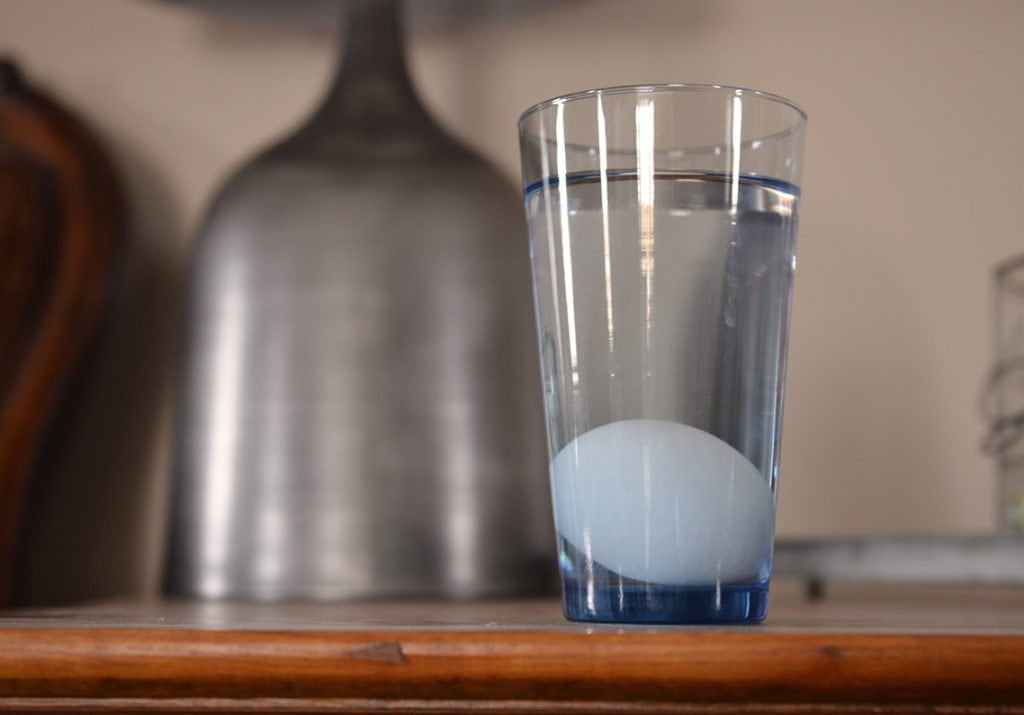
Safety: Always wash your hands after handling uncooked eggs because they may carry Salmonella.Ĭredits: Andrew Olson, PhD, Science Buddies Sandra Slutz, PhD, Science Buddiesĭid you know that if you put an egg in a cup of tap water, it will sink to the bottom? But, if you add enough salt, the egg will float back up to the surface! Why? Because the density of the egg is higher than the density of tap water, so it sinks.ĭensity (ρ), as shown in Equation 1, is the mass (m) of a material per unit volume (v). For example, the density of freshwater under standard conditions is approximately 1 gram (g) per cubic centimeter (cm 3). It includes 40 educational projects and 20 printables including a set of build-your-own 3D shape blocks, engineering challenge cards and a range of math games.Objective: Determine what salt concentration will float an egg
#Egg float test full#
It’s full of engaging and powerful learning opportunities in math and science, shared through ideas that incorporate art, play, sensory learning and discovery, for a whole-brain approach.

Preschool Classroom Egg Theme Lesson Plans More Math and Science Activities with Fizz, Pop, Bang!įizz, Pop, Bang! Playful Science and Math Activities is designed to bring hands-on fun to math and science play. This set includes active hands-on learning ideas and the following printables:ĥ) Numbers and Sets Matching Puzzles (2 variations for differentiated instruction)Ħ) Oviparous Animals Emergent Reader (2 variations)Ĩ) Egg Cards (for patterning, sorting, and ordering by size)ĩ) Oviparous and Non Oviparous Animal Sorting Activityġ0)Oviparous animal word cards Get Your Lesson Plans Each set includes over 30 playful learning activities related to the theme, and we’ve provided different versions for home preschool families and classroom teachers so all activities are geared directly toward your needs. Save time and get right to the playful learning with our printable lesson plan sets. I see even more explorations with water density in our future! Get a Full Week of Egg Theme Learning and Play And while playing with pumpkins in the water table, she noted that they float even if there was no salt in the water. While cooking with my mother she mentioned they could add water to make things float in their pot. She poked at it a bit and had fun watching push its way back to the top each time.Īfter doing this activity she showed what she had learned in various ways. Then she added salt to the glass with the hard-boiled egg to see if it would float, too.Īfter finishing the experiment, she wondered whether she could make the egg sink again. Why? Adding salt changes the density of the water, so the egg floats to the top. She didn’t think anything was going to happen.īut WOW was she surprised when that egg popped to the top! Then she slowly poured the salt into the glass with the raw egg. Then she dropped the hard-boiled egg into the water. Procedureįirst she dropped the raw egg into the water. (We had cooled it by running cold water over it, but it was still warm.) She predicted that the raw egg would float and turn the water cold. She predicted that the hard-boiled egg would sink and turn the water hot. We discussed what we thought might happen. One hard-boiled egg (Mark one egg so you can tell the difference.)īased on Lovey’s observation earlier that morning.Two containers of salt (Lovey measured 3/4 of a cup, but you could do the experiment with a bit less.).Materials for Floating Egg Science Experiment

I decided to set up this experiment so we can do a little learning before breakfast. We were boiling eggs for breakfast, and Lovey noticed that the eggs in the pan sink to the bottom. Lovey and I recently tried a variation of the traditional experiment. It’s simple and quick, but there’s a lot of learning involved too. In the classroom the kids were always amazed to see this egg trick I found at Funology. This floating egg science experiment involves just a couple of everyday materials you probably already have on hand! We love to do simple science experiments! At home and in the classroom science experiments are a very meaningful way to get kids engaged and thinking about the world around them. Share on Twitter Share on Facebook Share on Pinterest Share on Email


 0 kommentar(er)
0 kommentar(er)
